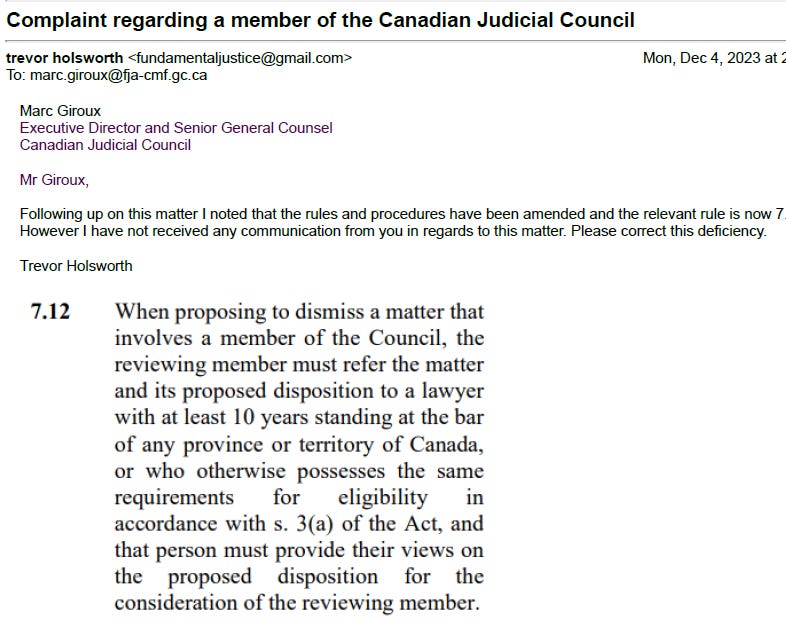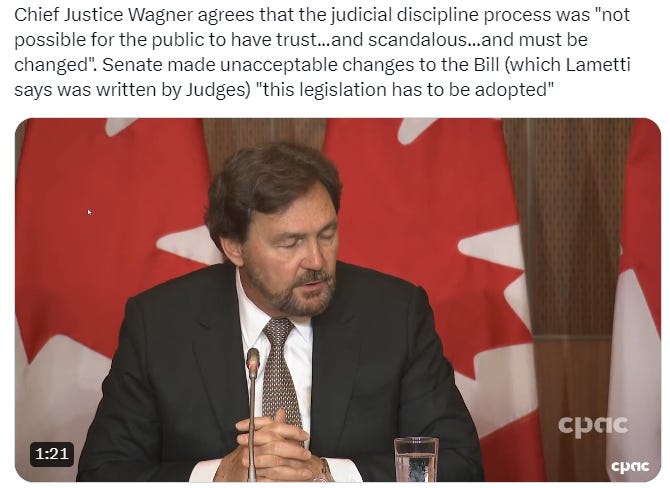The abusive procedure that is the Canadian Judicial Council
A process that lacks any standard at all.
Letter dismissing my complaint from the Canadian Judicial Council 28th August 2007
Discretion implies choice between two or more legitimate options.
If there is only one legitimate choice then it is a duty.
Unbounded discretion is a contradiction in terms in a democracy.
Fraud and corruption are always the exception.
Discretion implies good faith in discharging public duty.
After a couple of communications requesting the matter be reviewed which were denied. The Council then claimed that because Judge Duncan W. Shaw had retired that ended the matter. Shaw retired 6 months after my complaint but not before the Council had approved of the conduct. I attempted on numerous occasions to discuss the problem but was ignored. I was irrelevant, as I would later be told in the BC Supreme Court. The public perspective is irrelevant.
How can the Council judge judicial conduct appropriately when their staff claim they can ignore all the evidence…But that doesnt really matter, the Judge’s Act only gives the public the right to make a complaint. That is the end of the public right in the process. You “may” make a complaint. We will dismiss it, is the process. It is abusive.
So I complained about the conduct of Chief Justice Pigeon claiming that Judges have absolute power and their discretion is not subject to review.
Norman Sabourin the Executive Director and Senior General Counsel declared my complaint an abuse of process. The Ontario Law Society declared that the work that Mr Sabourin was doing for the Council was not as a lawyer and not subject to their review. In 2021 Sabourin retires after 16 years of dismissing complaints by the public.
after being hired by Beverley McLaughlin in 2004, former Chief Justice. Sabourin’s unilateral decision to examine the conduct of the good judge Patrick Smith who with the approval of the Chief Justice did some volunteer work, is perceived by many as to being the straw that broke the camel’s back. Smith’s appeal to the Federal Court resulted in the Court determining that the process was “abusive”.
Once again, I received no response as a response. But that is hardly a demonstration of good faith in the performance of a public duty. So I wrote again.
Once again, no response, although I do have confirmation that the email was viewed on numerous occasions and locations.
Given the seriousness of the matter I sent a registered letter.
Marc Giroux
Acting Executive Director and Senior General Counsel
Canadian Judicial Council
March 7th 2024
Registered Mail: RN 623 044 099 CADear Mr Giroux,
I attach the correspondence that I have sent to the Canadian Judicial Council. I have not received a response. A failure to respond cannot be said to be in “good faith”.
This does not generate trust in the process.
Let me know the plan to restore trust which would start by following with your procedures, and the Judges Act.
From the perspective of the public a judge protecting a judge protecting a lawyer committing fraud on a court order by calling upon the Plaintiff and preferring her testimony over the transcript is a clear display of bias, a failure in the rule of law and not in the public interest to be free of fraud and corruption in the legal system.
I note that the standard established for the judging of judicial conduct is;
“Is the conduct alleged so manifestly and profoundly destructive of the concept of impartiality, integrity and independence of the judicial role, that public confidence would be sufficiently undermined to render the judge incapable of executing the judicial office?”
I look forward to your response,
I never receive a response.
The Council is not subject to the Freedom of Information Act. I had attempted to get my personal records through an O’Connor application in the court process but denied there too. Attempts to get court audio from the court registry regarding some of the dates remains unresolved a year later even with a court order on the Registry and a complaint to that effect to the AG of BC Niki Sharma which also goes unanswered.
The Council is under the authority of the Chief Justice of the Supreme Court of Canada, Mr Wagner.
The Canada Bar Association commented in 2019 on the Council’s processes, or perhaps more correctly, the lack thereof.
A lawyer Slansky who had disagreed with a judge and made a complaint to the Canadian Judicial Council and then to the Federal Court made the very correct argument that the process established in the legislation and in the regulations did not comply with fundamental justice.
The problem re-articulated by the Judge, “iv) the complaint mechanism of the CJC, of having judge judging judges’ misconduct, is unconstitutional…gives rise to a reasonable apprehension of institutional bias and constitutes a breach…S 7 and 15 of the Canadian Charter…”
Slansky is entirely correct. The process is a sham, designed to insulate judicial conduct from effective review. As the legal expert in the field, Richard Devlin, stated in the debate in Parliament during the recent debate on the amendments of the Judges Act, that the public is unlikely to have trust in the process. But like everyone else who contributed, including myself, we were all ignored.
The Judicial perspective was the only perspective that mattered, and the protection of that by the Liberal Party with the support of the NDP was paramount. The Executive protecting the Judiciary in their abuse of the citizens of Canada, with the full knowledge of its abusive nature. We shall see if the Judiciary return the favor and improperly protect the Executive in their conduct against the citizens of Canada during the decision to enforce the Emergencies Act.
The only problem is that the changes made to the Judges Act do nothing to alter the regime, if anything they provide more confusion but they did allow an amendment which made allegations of sexual misconduct an automatic pass through the gatekeeper function. Allegations of bias, fraud or corruption receive no such preferential treatment. They are dismissed and removed.
“Judicial Independence does not require that the conduct of judges be immune from scrutiny by the Legislative and Executive branches of government…an appropriate regime for the review of judicial conduct is essential to maintain public confidence in the judicary”
Cosgrove v Canadian Judicial Council
”There is no better known rule of natural justice than the one that a man shall not be a judge in his own cause.”
House of Lords v Pinochet ( the Chilean dictator )
But since lawyers are involved in the process in Parliament…
”All the lawyers on the Justice Committee debating The Judges Act knowing that Judges are in conflict with their constitutional requirements they harassed a witness who stated that "Judges, Judging Judges, Doesn't Work." https://ruleoflawcanada.substack.com/p/petitioning-the-house-of-commons
They told him that Bill C-9 was going to pass but did he have anything to say before they ignored him…













